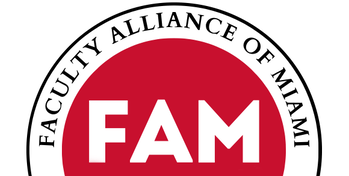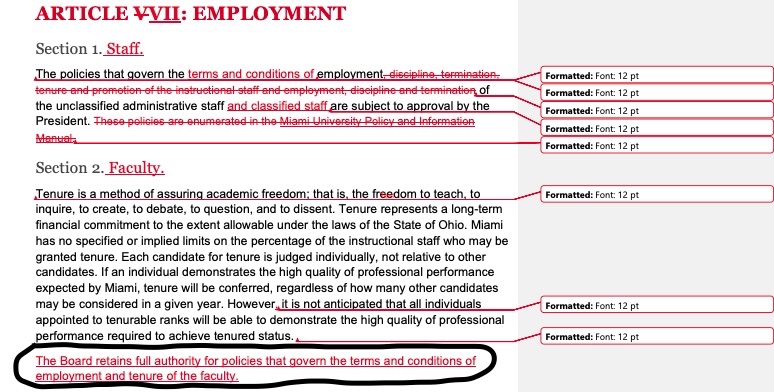This week, our Board of Trustees is set to pass new governance that would put Miami out of step with national norms and national AAUP recommendations. If the changes are approved [sadly, they were: see update], we may be entering a new era in which the Board intervenes on a regular basis in tenure and other employment policies.
We wrote the Board today to ask them to reconsider:
“The following addition to the regulations struck [us] as surprising: “The Board retains full authority for policies that govern the terms and conditions of employment and tenure of the faculty.”*
“Ohio Revised Code already gives the Board full authority over all Miami policies, so it doesn’t seem necessary to articulate specific authority over employment and tenure. More worryingly, the new language might encourage the Board (or a future Board) to begin to take an active role in tenure and promotion decisions. If that happened, Miami would be departing from AAUP recommendations and national norms. Miami might become subject to investigation by the state or national AAUP Committee on Academic Freedom and Tenure and potentially to formal censure by AAUP and to criticism in the national media.
“Here is the applicable language from AAUP’s Statement on the Governance of Colleges and Universities:
Faculty status and related matters are primarily a faculty responsibility; this area includes appointments, reappointments, decisions not to reappoint, promotions, the granting of tenure, and dismissal. The primary responsibility of the faculty for such matters is based upon the fact that its judgment is central to general educational policy. Furthermore, scholars in a particular field of activity have the chief competence for judging the work of their colleagues; in such competence it is implicit that responsibility exists for both adverse and favorable judgements. Likewise, there is the more general competence of experienced faculty committees having a broader charge. Determinations in these matters should first be by faculty action through established procedures, reviewed by the chief academic officers with the concurrence of the board. The governing board and president should, on questions of faculty status, as in other matters where faculty has primary responsibility, concur with the faculty judgement except in rare instances and for compelling reasons which should be stated in detail.
. . .
The governing board of an institution of higher education, while maintaining a general overview, entrusts the conduct of administration to the administrative officers—the president and deans—and the conduct of teaching and research to faculty. The board should undertake appropriate self-limitation.
“For similar reasons, faculty…are concerned about the Board’s specifying that it reserves the right to amend and reject the President’s policy decisions (p 141 of pdf). Again, the Board already has control by Ohio law over all Miami policy decisions, so it seems unnecessary to specify particular areas where the Board reserves the right to intervene—it always has that power. The concern is that the language might encourage the Board to intervene in areas where it would be more appropriate for it to delegate its power (please see AAUP’s recommendations on a university president’s role, part 4).
“Many of the other changes to the regulations appear to remove language that is redundant because already in Ohio Revised Code, so it would make sense not to add new redundant language—especially if it might encourage this board or future boards to depart from national norms.
“Again, the Board [may have] excellent reasons for considering these changes. Possibly the Board is addressing a current issue it sees as a problem. If that’s the case, maybe the Board could find another way to address the issue without creating a permanent and possibly dangerous shift in the traditional delegation of powers.”
The Board holds its public meeting on Thursday, February 20, at 11:30am in Marcum 180-6.
*Board of Trustees agenda, 162


Leave a Reply